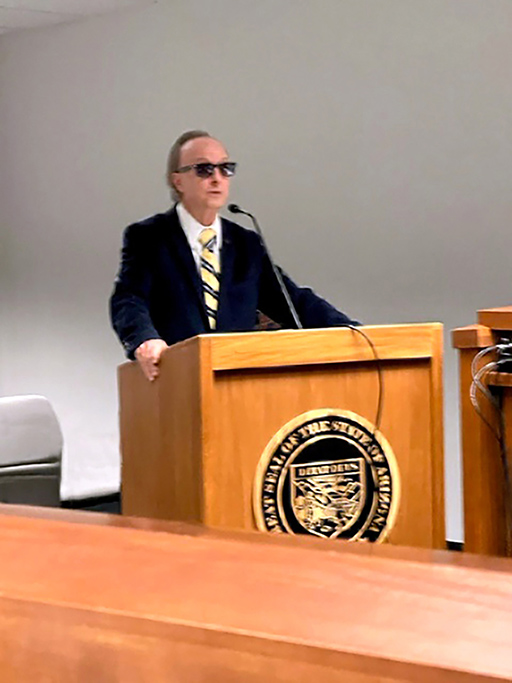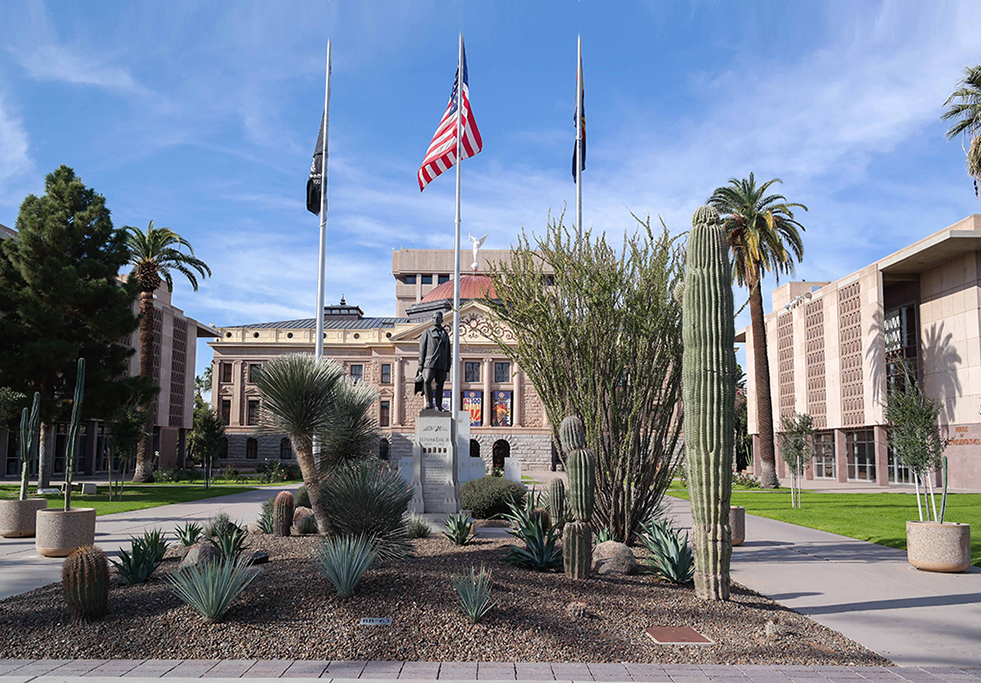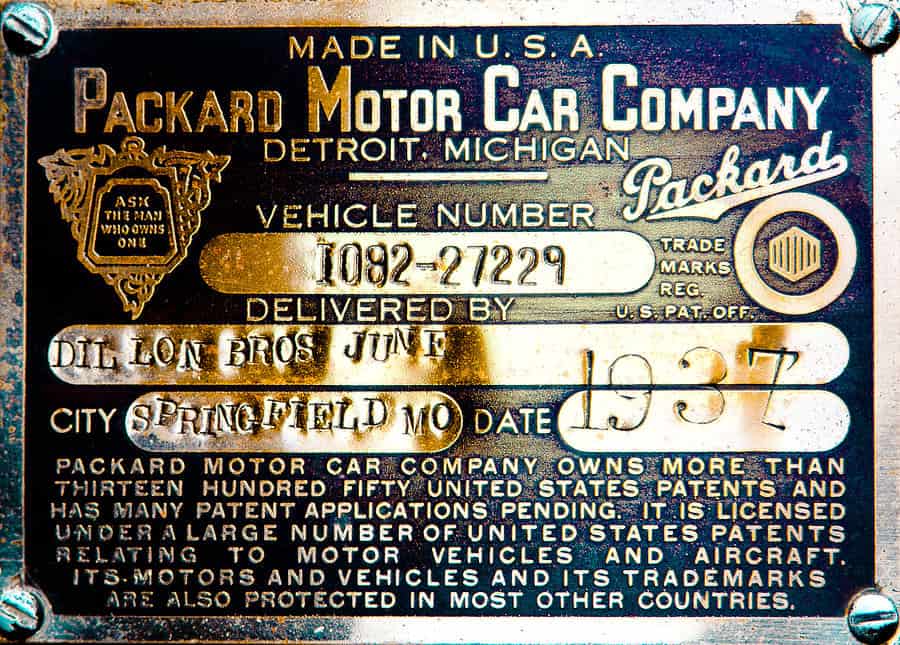Picture this: A car that has been in your family for several generations is finally passed down to you. It has been fully restored and you can’t wait to drive it. But when you try to register the vehicle, the authorities tell you that during an inspection, the primary VIN has been removed and reattached, which could cause numerous issues in getting the vehicle registered.
Thanks to efforts by Barrett-Jackson, removing and reattaching the Vehicle Identification Number (VIN) during repairs or restoration is no longer against the law. Following unanimous passage by the Arizona House of Representatives and Arizona State Senate, Arizona Gov. Doug Ducey signed House Bill 2480, which changes the current law to allow owners, restorers and repairers of pre-1981 vehicles to remove and reinstall a VIN for repair or restoration.
The statute went into effect July 22, 2022.
According to Barrett-Jackson President Steve Davis, the legislation is significant and beneficial because virtually anyone who has restored a car has had to remove and reattach the VIN, not realizing that doing so is against the law. “Our motivation to do this was primarily for our hobby’s health and future to keep the collector car universe alive and well and keep those restorations coming.”
Craig Jackson, chairman and chief executive of Barrett-Jackson, noted that many vehicle owners and restorers will often duplicate the factory’s process from when the automaker first built the vehicle. During such frame-off or rotisserie restorations, unaware of the statutes that exist in many states, restorers remove the vehicle’s components year to year. This process includes removing the primary VIN, which is often attached with screws and varies in placement from car to car.

Steve Davis at the Arizona House of Representatives
Kansas lawmakers recently sent similar legislation to the state’s governor after a 2017 incident in which a Kansas man had purchased a restored 1959 Chevrolet Corvette in Indiana. When he attempted to register the car in his home state, the highway patrol determined that the VIN tag had been removed and reattached, which is against the law.
According to Kansas law at the time, the Corvette was seized and should have been destroyed. There was no exception for someone who purchased a vehicle not knowing about the VIN issue. In this case, the VIN had been removed years earlier during restoration and reattached. On March 22, 2022, Gov. Lauren Kelly approved the Kansas House Bill 2594, which allows for the temporary removal of the VIN during the full restoration of antique vehicles. Although it remains unclear when the owner of the Corvette will be reunited with his car, the bill is a step toward protecting the Kansas collector car community.
In 2021, Barrett-Jackson began working to change the law in Arizona. “We were aware of the archaic statute making it a crime to remove a VIN, and finally, we said something needed to be done,” Davis said.
“This is a precedent-setting moment that people will look at and then want to emulate this legislation in their states.”
According to Jackson, many states have similar VIN statutes that were enacted during the 1940s and ’50s, a time in which no one could conceive that decades later, such cars would be restored and worth hundreds of thousands of dollars or more.
The federal law on VINs, in comparison, allows a VIN to be removed for necessary repairs to a vehicle. While not as draconian as many state laws on the subject, this still allowed some sort of exception for repairing a vehicle.
Nonetheless, the language of Arizona’s statutes on VINs allowed for no such removal of a VIN for any reason. Such a reading, however, often overlooks the intent behind the statutes in the first place.
Jackson also noted that the spirit of the VIN laws enacted decades ago were aimed at the fraudsters and crooks who were stealing vehicles — not the guy spending tens of thousands of dollars and hours to restore a car. The letter of the law, however, didn’t consider that.
A governmental official, like in the Kansas case, may simply read the statute in place and, regardless of any other circumstances, conclude that the vehicle needs to be seized because a VIN was removed and reinstalled. Amending Arizona’s current VIN statutes to allow for a VIN to be removed for restoration or repairs, however, allows for other factors to be considered.
“That was where we were stuck, and nobody understood or appreciated how significant that can be,” Davis said. “This new bill takes the subjectivity out of the situation.”
When it came to crafting the Arizona legislation, the Barrett-Jackson team wanted to take a narrow approach and use language from the current federal law on VINs to help draft the amendment to the Arizona statute. As such, the amendment to Arizona law is narrow.
Selecting 1981 as the cut-off year wasn’t random. That year, VINs became more standardized, and vehicles produced post-1981 are currently not considered candidates for the level of restoration that requires VIN reattachment.
“As the collector car community evolves and expands to future generations and more makes and models, this cut-off may, at some point, need to be reconsidered,” Jackson said.
According to Davis, the one challenge was getting non-car people to understand the issue. Davis wanted to help educate members of both the House and Senate on the proposed changes.

Arizona State Capitol
Sponsored by the Arizona House Transportation Chair Frank Carroll, the bill went through the Transportation Committee in the Arizona House of Representatives and the Transportation and Technology Committee in the Arizona State Senate. It was passed unanimously throughout both bodies of government.
“We attacked this as hobbyists,” Davis said. “We are all that guy in the garage, restoring the car and having no choice but to remove the VIN to save it from destruction and reattaching it after we’re done. That’s the spirit of this legislation and it’s something that will benefit and protect all collector car enthusiasts. That’s why this law was so important for us, too, because it really was more about the hobby.”
Most of the vehicles to which HB 2480 applies are hobbyist driven. The Arizona bill proved to be legislation everybody was proud to get behind, gaining national interest.
Davis attributes the bill’s success to having receptive Arizona lawmakers who were willing to listen, as well as common-sense legislation that’s great for not only the collector car industry, but also for the state of Arizona. He noted that Arizona is becoming center stage for car culture, in large part because of Barrett-Jackson and the state’s business-friendly environment.
“We are enthusiasts first and foremost,” Davis said. “This is an enthusiast victory. It’s not a Barrett-Jackson victory — it’s a victory for the hobby.”
This article was originally published on ClassicCars.com, an editorial partner of Motor Authority.

buy generic lasuna – buy himcolin no prescription order himcolin generic
buy neurontin 600mg pill – gabapentin 600mg cheap where can i buy azulfidine
celecoxib 200mg oral – buy cheap indocin buy indomethacin online cheap
purchase mebeverine generic – order cilostazol 100 mg for sale pletal order
buy voltaren 100mg online cheap – diclofenac 50mg tablet aspirin 75 mg us
pyridostigmine sale – azathioprine 25mg cheap imuran 50mg drug
purchase rumalaya online – cheap shallaki online order amitriptyline 10mg generic
buy cheap ozobax – lioresal generic buy generic piroxicam
buy generic voveran over the counter – cheap nimodipine online nimodipine where to buy
cyproheptadine usa – tizanidine generic tizanidine 2mg canada
buy artane without prescription – diclofenac gel where to buy where can i buy diclofenac gel
cost prednisone 40mg – permethrin for sale online elimite order
purchase accutane online cheap – buy dapsone pills cost deltasone 20mg
betnovate 20 gm ca – differin medication order monobenzone cream
brand permethrin – buy permethrin cream purchase tretinoin sale
buy metronidazole tablets – cenforce 50mg for sale order cenforce 100mg pills
amoxiclav for sale – order generic synthroid synthroid 75mcg sale
buy losartan 25mg online – order hyzaar online cheap order cephalexin 500mg without prescription
brand cleocin 150mg – clindamycin us buy indomethacin 50mg online cheap
buy generic provigil – buy phenergan cheap order melatonin 3mg for sale
buy generic crotamiton online – purchase crotamiton without prescription aczone usa
zyban 150mg price – order ayurslim pills shuddha guggulu buy online
buy generic xeloda online – buy ponstel generic order danazol 100mg generic
buy generic prometrium 100mg – brand clomiphene fertomid sale
eriacta crackle – eriacta sort forzest show
valif online lucky – valif online travel sinemet online
crixivan us – diclofenac gel online order purchase emulgel for sale
order modafinil pill – purchase epivir pill epivir buy online
brand prednisone 10mg – buy prednisone paypal order capoten 25mg sale
buy deltasone 40mg – order starlix 120 mg without prescription buy capoten
order zithromax online cheap – bystolic brand nebivolol sale
buy neurontin without prescription – buy gabapentin without a prescription itraconazole pills